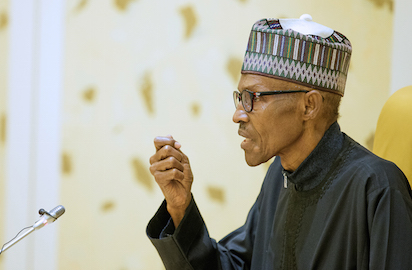Breaking News
Towards 2019: After Muhammadu Buhari, Then What?

by Tahir Sherriff
The last two years under President Muhammadu Buhari have been unprecedented in Nigeria – high unemployment rates, massive retrenchments, a recession, an agitation for secession, and heavy loss of lives in herdsmen versus farmer clashes. In the aftermath, a steadily increasing number of Nigerians who once regarded Buhari as a messiah have now vowed to vote him out of office in 2019.
The current political administration which came to power in 2015, became more publicly accepted when heavy confrontation, through well structured civil society organizations exposed the weaknesses of former President Jonathan administration on many fronts. The biggest – its failure’s in military leadership against Boko Haram, and the story of 219 kidnapped girls which ound their way not only into the hands of Hollywood actors, but even as a placard in the hands of the wife of former U.S President Michelle Obama.
Buhari’s dilemma’s
Unlike past Presidents of Nigeria, few people have been well loved and well hated at the same time. Nigeria’s former Central Bank Governor, Sanusi Lamido Sanusi, in 2002 described the public’s response to Buhari as such – “There seems to be a dangerous trend of competition between two opposing camps aimed at glorifying him beyond his wildest dreams or demonizing him beyond all justifiable limits, through a selective reading of history and opportunistic attribution and misattribution of responsibility”.
The former military ruler, and current democratic President hails from the Northern part of Nigeria, a region with unmatched literacy to population figures and a highly charged religious atmosphere. But more troublesome, with low levels of economic activity and as such, high unemployment rates.
Unemployment
In 2015 i wrote to question if Buhari would change the economic situation of northern youths, in retrospect, i would have advocated for the change to be more expanded to all of Nigeria’s youths. More young people have been hit hard by the unequal distribution of income, and the current economic instability. As a result, more young people are unemployed, especially in the northern parts of Nigeria. Buhari’s rise to power seemed as though a possible shift in this social dynamics – his core supporters: low income northern families and ethnically/religiously tilted intellectuals anticipated a change in the status quo under his administration. But two years down and more poor people have gotten poorer.
Power
The power sector has always been held as the sector with the keys to Nigeria’s economic growth. In the last two years, nothing significant has been reported in the sector – beyond distribution companies extorting local consumers. The privatization of the sector, although initiated under the Jonathan administration has resulted in heavy red-tapism, and a process bureaucratization that dispels any notion that the sector is now in private hands.
Finance
Although FITCH and the World Bank have hinted a possible financial growth for Nigeria in 2018, the last two years cannot be easily swept under the carpet. The Buhari’s administration was plunged into a recession in 2016 that significantly affected the administration’s ability to function. Budget preparation unveiled several gaps in the administration’s ability to work together cohesively. Price hikes saw millions of Nigerians trapped in petrol stations, and the dollar to Naira ratio has forced several international business-people out of the market. The administration also faced serious problems around corruption, and financial management. The Economic and Financial Crimes Commission has been in a gridlock with members of the senate, with a recent refusal by the Senate to confirm Ibrahim Magu as head of the EFCC.
Security
The menace of Boko Haram has been significantly reduced, but not entirely stopped. There have been several isolated attack cases where Boko Haram militants have attacked schools, communities, and local authorities. In January of 2018, suicide bombings have been reported in Dalori and Madagali, communities in Borno State with Boko Haram commander Abubakar Shekau still at large.
Beyond Buhari
Buhari’s administration, more than a great many other thing, is making a martyr of the Jonathan administration. Almost everything that went against the last administration is on a repeat. Protesters for the 219 girls have been facing massive opposition from the government with a recent arrest of its key member, former Nigerian minister Oby Ezekwesili.
Beyond this – incessant hikes in the price of petroleum, increased killings Fulani herdsmen, and a recent clamp down on Social Media have taken the centre stage and conspire towards increasing public disdain towards the current administration. One question is crucial though – should President Buhari be voted out of office, or should he refuse to run for a second term, how will the current problems that the country faces be addressed? Perhaps this should be the starting point of the conversation, as Nigerians move to the polls. After Buhari, then what?






